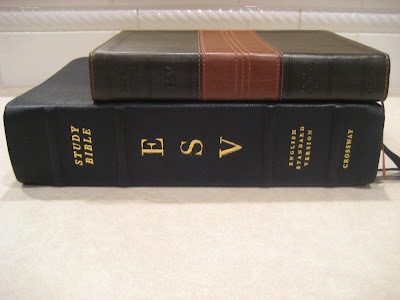Don't look for me to get one any time soon.
I love books. I love their feel, their smell. I love the turning of the pages. I like to look at them, feel them in my hands, see them on a shelf. There are few things in life more beautiful than a book shelf full of interesting books. I want a book in my hand, not a thin electronic device.
And since I love books so much, there are few things in life more exciting to me than going book shopping. Of course, going to a book store is the absolute best, but one cannot always do that. Besides, a book store will not usually be carrying a given particular book I may be looking for. That is because I am picky when it comes to books. I know what I want and that usually means something rare, something specific, and definitely in hardcover.
Some day I want a huge house with an entire floor dedicated to my library. Why not?
So anyway, tonight I went on-line shopping for resources on the book of Isaiah. I already have access to the usual suspects--Matthew Henry, John Gill, John Calvin. Don't get me wrong, these are all valuable. But they are on-line. They're not on my shelf. And if I'm going to learn this book I'm going to learn it well, so I'll want more than three teachers.
When I studied and taught Galatians I had access to eight commentaries, all of which I read in their entirety. By far my favorite was Martin Luther's. It was priceless for its historical value alone. I could feel his passion jumping off the page as he expounded the doctrine of sola fide, likely from hand-copied pages of Paul's epistle. Luther's commentary was especially interesting in light of the fact that it was written at the height of the Reformation and that the Reformation centered around teaching found in that book.
Another great one was one I discovered by "accident." It was written by George G. Findlay, a late 19th century Methodist preacher who was simply astounding in his insight.
These are my teachers, my seminary professors. These are the men God gifted to the Church for my benefit.
Ephesians 4:[11] And he gave the apostles, the prophets, the evangelists, the shepherds and teachers, [12] to equip the saints for the work of ministry, for building up the body of Christ, [13] until we all attain to the unity of the faith and of the knowledge of the Son of God, to mature manhood, to the measure of the stature of the fullness of Christ,With that in mind, and with cash short, I went looking for one additional commentary I had in mind (actually two, one now and one later), and one rare, odd, or more interesting choice. I think I have found them.
The first is part of a series which I have always found reliable and valuable. It is the New American Commentary Series. It has Isaiah in two volumes. I found both volumes at one low price, and not a bad price considering they are hardcover and new.
As for my exotic choice . . . I am certainly coveting a particular book right now and will likely get it next. It is The Commentary of Ibn Ezra on Isaiah.
Never heard of him? According to Wikipedia:
Rabbi Abraham ben Meir Ibn Ezra (Hebrew: אברהם אבן עזרא or ראב"ע, Arabic ابن عزرا; also known as Abenezra) (1089 — 1164) was born at Tudela, Spain in 1089, and died c. 1164, apparently in Calahorra. He was one of the most distinguished Jewish men of letters and writers of the Middle Ages. Ibn Ezra excelled in philosophy, astronomy/astrology, poetry, linguistics, and exegesis; he was called The Wise, The Great and The Admirable Doctor.Yeah. That guy. I feel like now would be a good time to start my collection of his commentaries.













